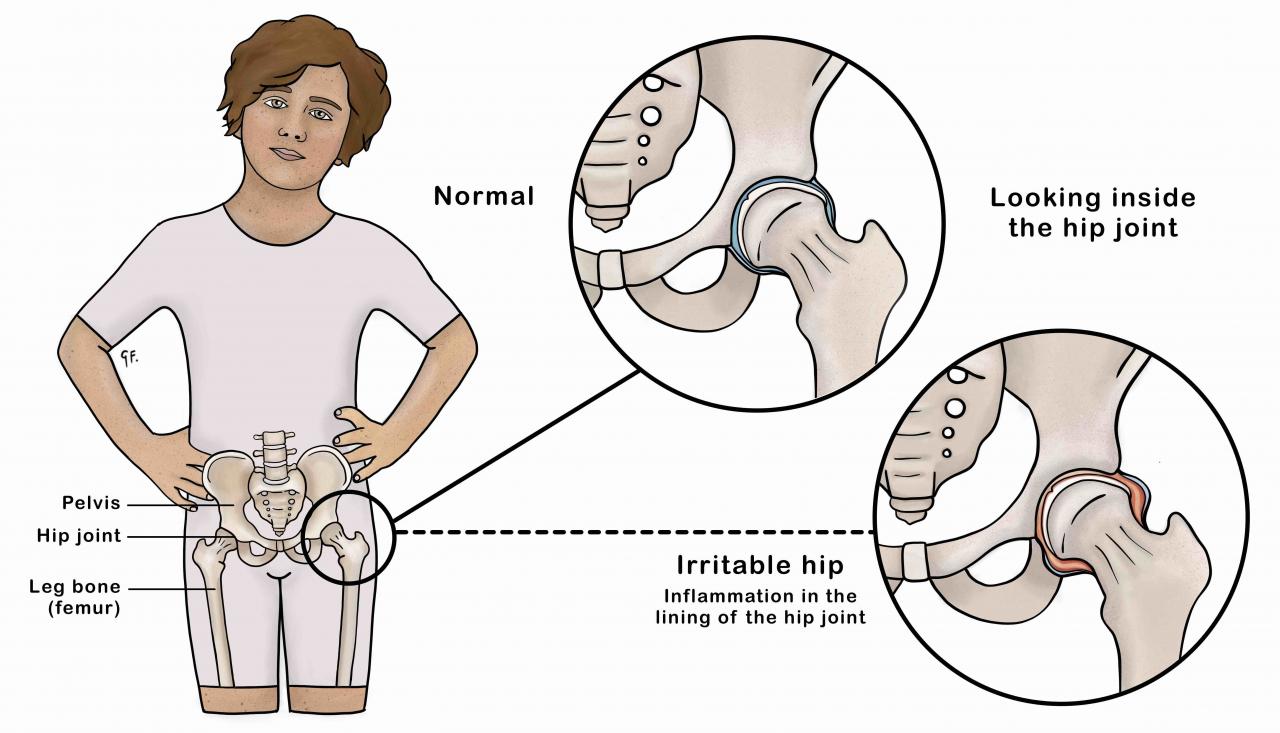Irritable Hip In Children
Irritable Hip In Children
Irritable hip is one of the most common causes of limping in tamariki (children). The medical name for irritable hip is transient synovitis. Irritable hip is not serious and your child will get better with rest and time.
Key points about irritable hip
- irritable hip (transient synovitis) is one of the most common causes of limping in tamariki
- you can look after your child at home
- it usually takes 2 weeks until tamariki fully recover
- medicine (ibuprofen) and rest help with healing
What is irritable hip?
Transient synovitis is inflammation (swelling) in the lining of the hip joint. It can cause pain in the hip joint.
What causes irritable hip?
No one knows exactly what causes irritable hip. It can happen in tamariki who have recently had a viral infection, but there is no infection in the hip joint itself.
Who gets irritable hip?
Tamariki who get irritable hip are usually between 3 to 8 years old.
What are the signs and symptoms of irritable hip?
Usually only one hip is affected.
Your child may:
- have a limp or difficulty crawling or standing
- complain of pain in the hip, groin, thigh, or knee
- have a low fever up to 38°C, but usually they have a normal temperature
When should I seek help for irritable hip?
You can usually look after your child with irritable hip at home. You won't usually need to see a doctor.
Take your child to the doctor if your child:
- develops a fever above 38°C
- has redness or swelling anywhere on the affected leg
- has increasing pain that cannot be controlled with pain relief medicine
- is complaining of pain when sitting or lying still
- has pain or swelling in any other joints
- has been unwell for a week or more
Take your child to the doctor if you:
- are worried your child's pain might have been caused by an injury
- feel concerned that your child is becoming more unwell
Will my child with irritable hip need any tests?
Tamariki with irritable hip usually do not need tests. But if you need to see a doctor, they may suggest your child has some of the following to rule out infections or injuries:
- blood tests
- an x-ray
- in some cases, an ultrasound
See the KidsHealth section on x-rays and scans to learn more about scans
What is the treatment for a child with irritable hip?
Irritable hip is not a serious condition. You can usually look after your child at home. Things usually start to improve after a few days. Most tamariki are back to normal before 2 weeks.
You don't need antibiotics because irritable hip is not caused by a bacterial infection.
There are some things you can do at home to help.
Giving regular pain relief
Paracetamol
If your child has pain, you can give paracetamol to make them more comfortable. You must follow the dosage instructions on the bottle. It is dangerous to give more than the recommended dose.
Other medicine
If your doctor gives your child ibuprofen (such as Nurofen or Fenpaed), or if you buy it at the pharmacy, follow the dosage instructions carefully. It is dangerous to give more than the recommended dose.
Never give aspirin
Never give your child aspirin as this may increase the risk of Reye syndrome, which is a rare and serious illness.
Encouraging your child to rest and to drink plenty of liquid
Encourage your child to rest and to limit their activity. Most tamariki will do this themselves while they are sore.
Encourage your child to drink plenty of fluid.
Are there likely to be any complications from irritable hip?
No. Tamariki who have had irritable hip do not develop long-term problems in their hips.
This page last reviewed 01 September 2023.
Do you have any feedback for KidsHealth?
If you have any feedback about the KidsHealth website, or have a suggestion for new content, please get in touch with us.
Email us now
